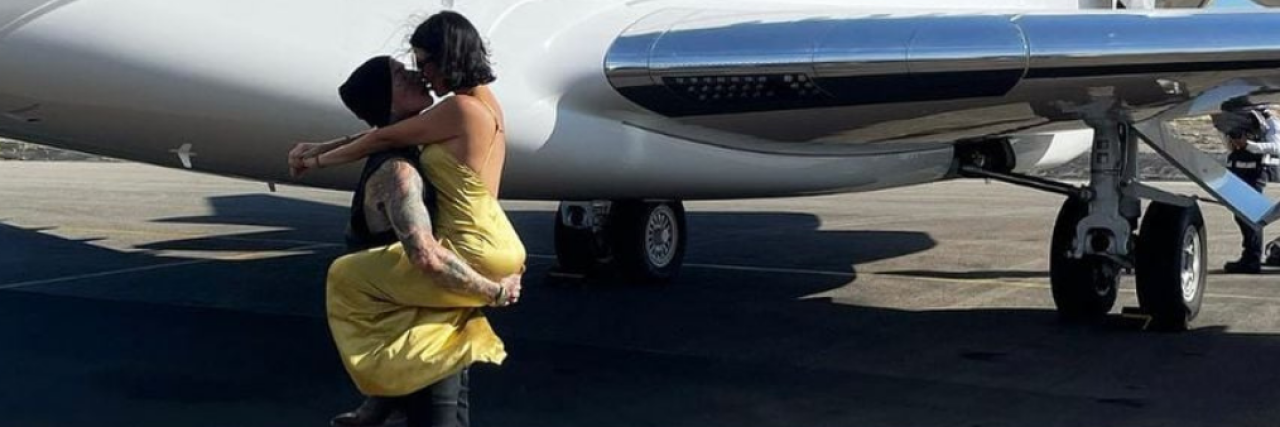Why Blink-182 Drummer Travis Barker’s Recent Flight Matters for Trauma Survivors
Editor's Note
If you’ve experienced sexual abuse or assault, the following post could be potentially triggering. You can contact The National Sexual Assault Telephone Hotline at 1-800-656-4673.
Over the weekend, Blink-182 drummer Travis Barker did something he hasn’t done in over a decade: He boarded a plane for Cabo, Mexico alongside his girlfriend, Kourtney Kardashian, and two others.
While this may sound like an easy feat for most, Barker has remained very open about living with post-traumatic stress disorder (PTSD) after he barely survived a 2008 plane crash that covered nearly 65% of his body in third-degree burns. For this reason, Barker’s decision to fly to Mexico over the weekend is more than just everyday celebrity news — it’s a tale of overcoming what some may consider insurmountable trauma.
View this post on Instagram
Just like most “emo kids” of the late 90s and early 2000s, I grew up listening to Blink-182. However, that wasn’t the only reason why I connected so strongly with the story of Barker’s recent travels. I actually felt moved by his adventure because I also have severe trauma surrounding mass transit.
Although I never lived through a horrific plane crash like Barker, I did endure over two years of abuse from a peer, and most of the sexual abuse occurred in the back of a school bus. From the time of the first “incident,” even seeing a bus from a distance triggered fear and panic throughout my body, which matches up with how Travis Barker described his fear of airplanes after his crash.
As soon as I got my driver’s license, I vowed to drive myself everywhere I needed to go and I never looked back — much like Barker used ground transportation after the crash. In college, I refused to use the on-campus shuttles and would instead walk or ride my bike between classes, even if they were across campus from each other. When I started student teaching high school marching band, I opted to drive myself or ride in a car with someone else to all of the away games and competitions so I didn’t have to board one of those dreaded yellow school buses. In other words, I took the same approach to buses as Barker did with planes: I did everything I possibly could to avoid boarding a bus for over a decade.
Unfortunately for people like myself and Barker, it’s impossible to live a full life and explore the world without traveling by plane, train or bus at some point. Planes make foreign travel possible, and they definitely make domestic trips less time-consuming. Buses, trains and subways not only help with morning commutes, but they make navigating unfamiliar cities much easier. In fact, over 10% of Americans use some form of mass transit on a daily basis.
Overcoming post-traumatic stress disorder is a tall order, though. It often requires months of intense therapy that often includes some form of exposure work. For me, this has included a combination of Skills Training in Affective and Interpersonal Regulation-Narrative Therapy (STAIR-NT) and cognitive processing therapy (CPT) to revisit my trauma and lower the emotional responses I experience when triggers (like buses) come up. It also requires you to develop strong coping skills, like the breathwork and visualization practice Barker recently discussed during an interview with Men’s Health.
As I make continued progress in my own recovery from PTSD, I am starting to explore exposures just like Barker’s flight this weekend. In fact, I have a trip planned in October that will require me to not only board an airplane but also utilize the bus and train systems in Chicago — something I’m fortunate enough to do alongside my girlfriend who has been one of my biggest recovery supporters.
I know firsthand how terrifying it is to face your trauma-related fears head-on, but I can’t wait to see if Travis Barker makes a public statement about his experience once he returns from Mexico. After all, his wisdom and insight can serve as a beacon of hope for countless other people like me who also live with PTSD.
Photo via Travis Barker/Instagram

